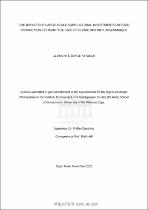| dc.contributor.advisor | Zamchiya, Phillan | |
| dc.contributor.author | Ntauazi, Clemente Jorge | |
| dc.date.accessioned | 2022-11-10T07:36:57Z | |
| dc.date.available | 2022-11-10T07:36:57Z | |
| dc.date.issued | 2022 | |
| dc.identifier.uri | http://hdl.handle.net/11394/9437 | |
| dc.description | Magister Philosophiae - MPhil | en_US |
| dc.description.abstract | Large-scale agricultural investments in Mozambique peaked following the food, fuel and finance crises in 2008 and so far, more than 34 land deals have been established in the country. Proponents of such investments point to the advantages of capital investment, market adaptability and economies of scale. The large-scale agricultural investments have intensified as a mechanism to address food demands, ensure food security and improve production and productivity patterns. This study analyses the impacts of large-scale agricultural investments on the food production of small-scale farmers in one district. The main question guiding the study is: what are the impacts of large-scale agricultural investments on the food production systems of small-scale farmers and what is the significance of the dynamics of agrarian change of land labour, input or technology and livelihoods in Gurué district? Specifically, the study assesses the impacts on small-scale farmers’ access to, use and control of the land; on agricultural inputs and farming technology; and on household employment and livelihoods’ trajectories. | en_US |
| dc.language.iso | en | en_US |
| dc.publisher | University of the Western Cape | en_US |
| dc.subject | Food production | en_US |
| dc.subject | Food security | en_US |
| dc.subject | Agriculture | en_US |
| dc.subject | Labour power | en_US |
| dc.subject | Farming | en_US |
| dc.subject | Mozambique | en_US |
| dc.title | The impacts of large-scale agricultural investments on food production systems: The case of Gurué district, Mozambique | en_US |
| dc.rights.holder | University of the Western Cape | en_US |

